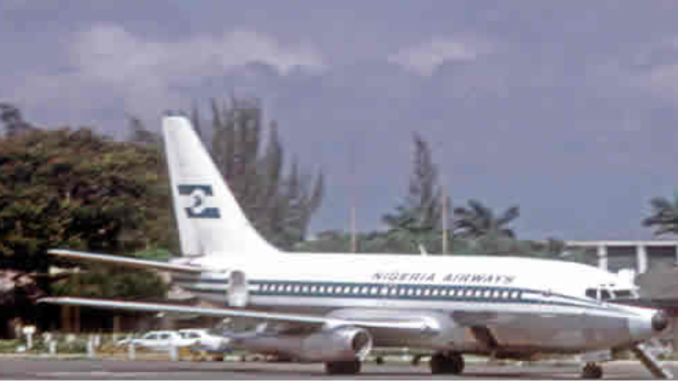
PLANS for a new national carrier have gone far, but the authorities should see it as a hot soup, which the wise begins to lick from the periphery. The Minister of State for Aviation, Hadi Sirika, had in a Twitter message recently rhapsodised about the opportunity the Third World Aviation Forum hosted by Nigeria would offer her to ink a Memorandum of Understanding with Boeing – the American aircraft manufacturer – for the project’s take-off. He hinted that Airbus France had also shown interest, especially in setting up an aircraft hangar here, for repairs and regular maintenance. Nigeria is a huge market with its estimated 180 million people.
President Muhammadu Buhari, whose government has been enthusiastic about the project since he assumed office, has revealed that he is under enormous pressure from prominent Nigerians to see it through. However, he was right in saying that “Nigerians need to know how we lost the one (Nigerian Airways Limited) we had before.”
Nigeria has not only lost its national carrier, but has also become a graveyard for scores of private airlines. Check this: the wings of EAS, Sosoliso, Savannah, Triax, Oriental, Concord, Dasab, Albarka, Fresh, Okada, Harka, Harco, Belview and ADC airlines no longer caress Nigeria’s airspace. Airlines still in business are weighed down by debts, thus pushing them to the precipice.
In September 2015, the government had empannelled a 13-member committee to work out the modalities for setting up a new national carrier. This in fact, was giving effect to the recommendations of the Ahmed Joda-led political transition panel report. To underscore its seriousness, the government in May this year hired a consortia of six firms, which included Lufthansa – the German national carrier – with $4.99 million for advisory services.
According to Buhari, national pride and job creation are the reasons for the new obsession. About 400 trained Nigerian pilots are reportedly jobless. But two years is enough time for details of the reviewed report of the collapse of NAL to be out. This was one of the terms of reference of the 2015 panel, chaired by a former Managing Director of Discovery Airlines, Mohammed Abdulsalam.
Former President Olusegun Obasanjo, who distanced his administration from resurrecting NAL, lamented: “When I was leaving office in 1979, there were 32 aircraft in the Nigeria Airways fleet, but when I came back in 1999, I only met one. I looked back to history and discovered that the board of directors of the airline was corrupt. The board will form a company in Jersey Island, and will give the repairs of the aircraft to that company. So, that was how they embezzled the airline’s funds and ran it down.” The airline was formally liquidated in May 2003.
Undoubtedly, MoUs with Boeing and Airbus alone will not guarantee the success of a new carrier. Painstaking planning and implementation are required: a comprehensive overhaul of the operating environment is unavoidable. Virgin Nigeria ended operations abruptly. The owner of Virgin Atlantic, Charles Branson, cited the manipulation of an agreement he had reached with Abuja as the reason. The Royal Dutch Airline – KLM – in October pulled out of Zimbabwe, and Zambia, citing difficult operating environment; so did Air France and Lufthansa from Zambia.
These cases underline the fact that the aviation business is governed by international best practices. The Murtala Muhammed International Airport, the country’s best, and the Port Harcourt International Airport, were ranked this November among the 20 worst airports globally, in a survey conducted by Sleep in Airport website. The criteria used are: comfort services, cleanliness, customer services, navigation, immigration and sleep-ability. The right infrastructure is simply not there to run modern airline business in the country, just as the official corruption that midwifes the shortcomings in the aviation sector has not been addressed.
But should the Buhari government insist on forging ahead with the project, it must be private sector-driven: world class investors who will bring in capital and technical expertise to bear on the whole set-up. The lessons the NAL ruins sign-post and Nigeria’s gross incompetence in managing public concerns dictate that it holds minority equity in the new airline.
However, it is not for nothing that developed nations are running away from ownership of national carriers altogether. Mergers and privatisation have become the vogue because of bitter experiences. The UK has since 1987 privatised the British Airways, and her airports for efficient service delivery; just as Air France and KLM merged in 2004. Lufthansa’s ownership transferred to private hands with 88.52 per cent equity holding, while three per cent went to its members of staff.
The FG should not been deluded by the Ethiopian Airline’s miracle, as the fast growing, largest and most profitable in Africa. Nigeria does not have the national discipline to take the risk the way Ethiopia has done.
A country that desires its aviation sector to be world class should not allow its agencies to become obstacles instead of being vehicles for success. Sadly, that is the story of Nigeria. They charge high taxes, multiple fees and levies. The President, African Development Bank, Akinwunmi Adesina, bemoans this trend, citing it as the reason for the high cost of air travel in Africa, put at 200 per cent more than the cost in Europe. Therefore, Nigeria should look well before it leaps, this time. All that the government needs to do is to clean up the mess that made six domestic airlines to accumulate a debt overhang of about N130 billion.
END

Be the first to comment